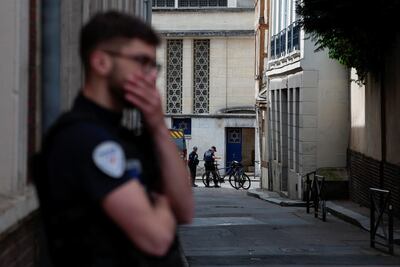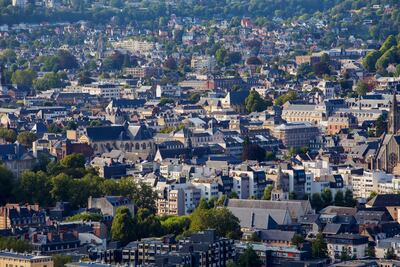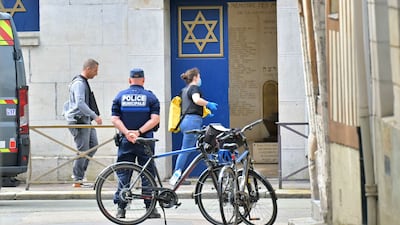French police shot and killed a man who appeared to be trying to set fire to a synagogue in Rouen on Friday, the Interior Ministry said.
Interior Minister Gerald Darmanin confirmed the armed individual was dead in a post on X.
“In Rouen, national police officers neutralised early this morning an armed individual clearly wanting to set fire to the city’s synagogue. I congratulate them for their reactivity and their courage,” he said.
Police responded at 6.45am to reports of "fire near the synagogue".
National police said smoke was rising from the building and officers came face to face with the suspect on arrival.
A source told news agency AFP the man "was armed with a knife and an iron bar, he approached police, who fired. The individual died".
"An armed man somehow climbed up the synagogue and threw an object, a sort of molotov cocktail, into the main praying room," Rouen's mayor, Nicolas Mayer-Rossignol told reporters.
The synagogue was surrounded by a series of security cameras, he said.
The ministry confirmed the suspect had been shot dead.
A fire has been brought under control on site, a Rouen city hall official said.
Two separate investigations have been opened, one into the fire at the synagogue and another into the circumstances of the death of the man killed by police, Rouen prosecutors said.
France's police inspectorate general automatically investigates incidents in which people are killed by police.
The National Anti-Terrorism Prosecutor's Office said it was assessing whether it will take up the case.
"Attempting to burn a synagogue is an attempt to intimidate all Jews," Yonathan Arfi, president of the Representative Council of Jewish Institutions of France (CRIF). wrote on X.

"Once again, there is an attempt to impose a climate of terror on the Jews of our country. Combating anti-Semitism means defending the Republic."
Rouen's Rabbi Chmouel Lubecki, told BFM TV the community was not afraid.
"Tonight is Shabbat and it is important to light the candles to show that we're not afraid, that we continue to practice Judaism despite the circumstances," he said.
France hosts the Olympic Games in just over two months and recently raised its alert status to the highest level against a complex geopolitical backdrop in the Middle East and Europe's eastern flank.
The Holocaust Memorial in Paris was daubed in graffiti this week, prompting anger from people including President Emmanuel Macron who condemned what he called "odious anti-Semitism".
A spate of Islamic extremist attacks that swept the country from 2015 also involved Jewish targets. There have been isolated attacks in recent months and France's security alert remains at its highest level.
Rouen's mayor said the Normandy town, which is 130km north-west of Paris, was "battered and shocked".
"It is not only the Jewish community that is affected," said Mr Mayer-Rossignol wrote on X. "It is the entire city of Rouen that is bruised and in shock."

There were no other victims other than the attacker, he said.
Elie Korchia, president of France's Consistoire Central Jewish worshippers' body, said police had "avoided another anti-Semitic tragedy".
The area was rocked by an attack later claimed by ISIS in 2016, when a priest was stabbed to death during a church service in town of Saint-Etienne-du-Rouvray.
France has the largest Jewish community of any country after Israel and the US, as well as Europe's largest Muslim community.
The incident on Friday came weeks after a Warsaw's main synagogue was firebombed. The building sustained minimal damage and nobody was hurt.
The Anti-Defamation League this month warned "the future of Jewish life in the West" was under threat.
The annual report from the ADL, the leading Jewish advocacy group, said anti-Semitic incidents had been increasing before the Israel-Gaza war erupted in October, but the ensuing conflict had fuelled "a fire that was already out of control".
In France, the number of anti-Semitic attacks increased from 436 in 2022 to 1,676 the following year, with physical assaults increasing from 43 to 85.
Incidents in Britain rose from 1,662 to 4,103, including 266 physical assaults.


